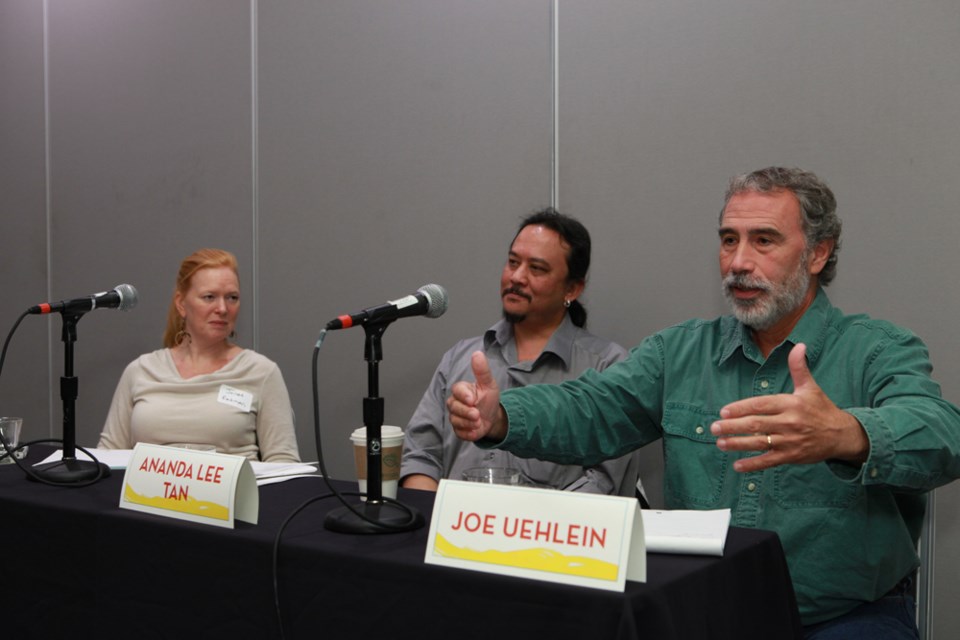When it comes to that delicate balancing act between protecting jobs and protecting the environment, Burnaby resident Ananda Lee Tan’s would rather upset the scale.
The veteran union organizer has roughly three decades of experience under his belt, and he insists the dichotomy of jobs versus the environment is false one.
For the past six years, he’s been with the Climate Justice Alliance, working with communities that live close to harmful extractive polluting industries, helping them negotiate alternatives in their respective industries. He calls this a new, emerging area of “just transition,” which he defines as a strategic pathway from the present “dig, burn, drive, dump” economy to one where the well-being of people and the planet come first.
Q: Unions don’t create the jobs or determine how much energy is consumed while doing the work. So what exactly should they be doing to protect the environment?
A: Unions need to play a leadership role in rethinking, recreating and rebuilding a new economy, where we make the economy work for people and planet. … That will mean also fulfilling a long-term views of the labour movement, moving past the short-term, what I would call a business union model, towards a long-term social justice ideals of the original labour movement.
Q: What advice would you give a union that represents people who rely on fossil fuels, but also represents people whose jobs may be at risk due to an oil spill, for example.
A: What is a just transition pathway to local living economies that will sustain not only our jobs, but the jobs of our children and grandchildren?
Unions need to play a leadership role in building the new economy for people and planet. Unions have the expertise to do that. They need to step up to their own long-term responsibilities but also engage their own rank-and-file members, the people who know how to build the infrastructure we need to sustain ourselves, who know how to build the renewable energy infrastructure, the transportation infrastructure, the long-term housing infrastructure.
Q: How do they do that?
A: First of all, we need to start negotiating with the biggest extractive industries. We need our government to start working for us rather than the corporations, and that can only happen locally, town by town, community by community, municipal district by municipal district. Then move up to the provincial and federal levels, negotiating power.
Our unions work for community groups, reassert power up the land base and ensure that we are working with First Nations as well.
If we align ourselves on the grassroots and make sure we are taking back the resource theft that is taking place by big private corporations –stealing our water resources, our food resources, our forest resources, our mineral resources – and ensure that a greater portion of those benefits are being directly invested in the infrastructure, in a new economy, in a people’s economy infrastructure, where communities can not only control energy resources, food resources, building resources, this is about people taking back the land and the resources from multinational corporations. Our days are numbered on this planet as a result of their carbon intensity, the pollution intensity, the toxin intensity, the layered destruction of the planet.
Q: You’ve done work internationally. What have you seen in other parts of the globe that’s worked?
A: There are some amazing models. For example, Cuba, they were forced, due to an economic embargo placed by the U.S. – people were starving at one point as a result of this economic embargo. As a result, they had to shift from an industrialized model to an agroecology model just to meet their food needs.
What they transitioned to while moving to an agroecology, local sustainable food model, they’re not only (enjoying) domestic food security, they are in a position to actually export some of these organic foods. The agroecologists in the last year who have been down there say that it’s like their nutritional levels are amongst the highest in the Americas now from feeding themselves.
Q: There are some people who want the environment protected and others who say you are going to kill jobs if you do that. What would you say to their union leaders?
A: Unions, if they can do one thing towards creating the new economy, it’s democratizing their own decision making. … They need to go back to the basics of organizing 101, taking these issues back to the rank and file, engaging them in discussions, local by local, community by community so that there can be local intelligence from the rank and file applied to design a new economy.
-This article is part of our Salute to Labour section for Labour Day.



